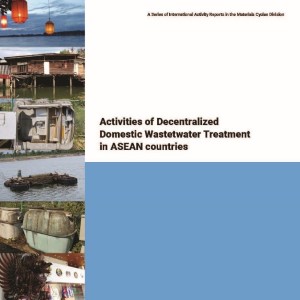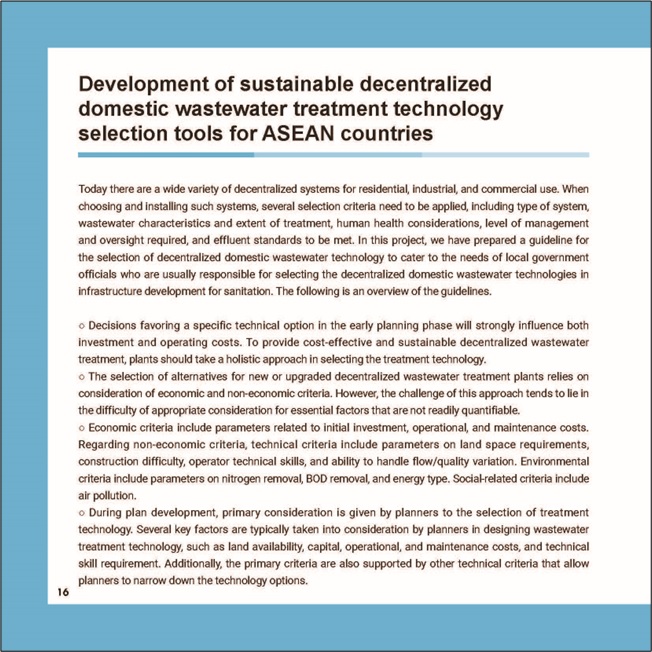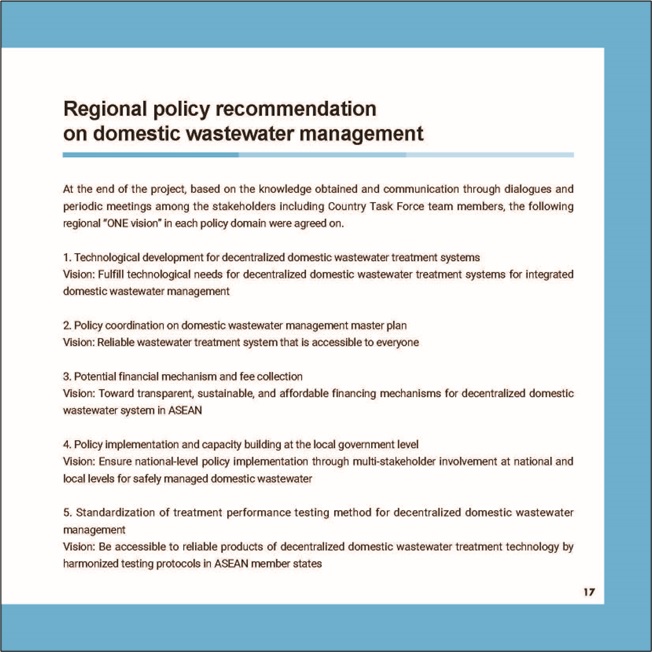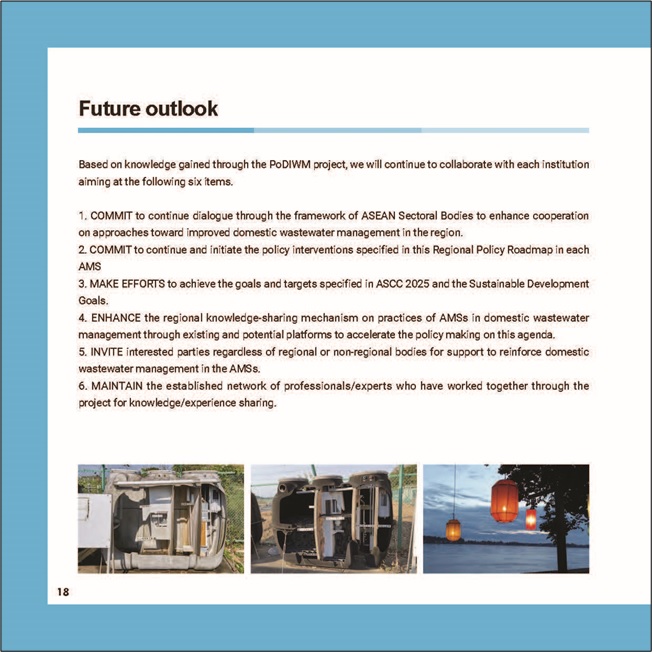
Policy Brief compiled for policy makers to promote decentralized management of domestic wastewater in Southeast Asia
June 16, 2022
| International Waste Management Research Administration Office of the Material Cycles Division, the National Institute for Environmental Studies has compiled results of its research project on the introduction of decentralized treatment systems to promote proper management of domestic wastewater in Southeast Asia into a policy brief for local government policy makers. |
1. Background

The International Waste Management Research Administration Office of the Material Cycles Division (referred to as "International Administration Office" in this press release) has compiled a policy brief based on the results of the "Policy Dialogue and Network Building of Multi-stakeholders on Integrated Decentralized Domestic Wastewater Management in ASEAN*1 Countries" (JAIF-PoDIWM) project. The project was supported by the Japan-ASEAN Integration Fund (JAIF)*2 and ended at the end of December 2020 (See Fig. 1).
Southeast Asian countries have been facing rapid economic growth and industrialization, as well as an increase in domestic wastewater due to population growth; yet the systems and institutions to implement appropriate wastewater treatment have not sufficiently been developed, and effective treatment technologies have not spread. Against this background, the JAIF-PoDIWM project was implemented to reaffirm common and distinctive issues and problems faced by the ASEAN region as a whole and each member country, and establish network of policy makers and experts to lead to substantive problem solving through policy formation and implementation at national and city levels.
2. Overview of the Policy Brief and expected outcomes
The Policy Brief first explains background and objectives of this project, and then describes benefits and advantages related to the introduction of decentralized domestic wastewater treatment. In properly managing decentralized technical systems, including Johkasou (Japanese-style septic tanks), it is essential not only to establish rules at the time of construction and installation, but also to establish a framework for periodic inspection, maintenance, and functional evaluation. For this purpose, the need for human resource development in government agencies and industry organizations was highlighted in view of the current institutional and technical status and issues related to water environment and domestic wastewater management in nine Southeast Asian countries*3. Taking into account the current status and characteristics of these countries, the Brief introduces decision support tools for selecting sustainable decentralized domestic wastewater treatment systems.
In addition, the Brief presents five recommendations for proper management of domestic wastewater: development of technology for decentralized domestic wastewater treatment systems; coordination for implementation of a basic plan for domestic wastewater management; financial preparation and development of a treatment fee collection system; effective implementation of policies and human resource development at the municipal level; and establishment of test method standards for performance evaluation. Finally, the Brief concludes with a future vision and declarations by practitioners and researchers who participated in the project (See Fig.2).
This Policy Brief is expected to be utilized by stakeholders to promote regional applications of the research results. This will be an important outcome both as an effective way of benefiting society with the research results and an opportunity for substantive policy contribution.
The International Administration Office will continue to support social implementation of research results from various international joint research activities of the Material Cycles Division, and disseminate the results that have a large global ripple effect.
3. Obtaining the Policy Brief
The Policy Brief is available at:
https://www-cycle.nies.go.jp/jp/report/policybrief1.html
(For requesting a printed version, please contact the person in charge below.)
*1 ASEAN: The Association of Southeast Asian Nations
*2 A fund established at the ASEAN Secretariat in 2006 based on contributions from the Government of Japan to support ASEAN proceeding with integration toward the establishment of the ASEAN Community (Japan-ASEAN Integration Fund).
*3 9 ASEAN member countries that participated in the JAIF-PoDIWM project: Brunei, Cambodia, Indonesia, Laos, Malaysia, Myanmar, Philippines, Thailand, and Vietnam, excluding Singapore, where the proper management system for domestic wastewater is already widespread.
Release URL
-
http://www.nies.go.jp/whatsnew/20201029/20201029-e.html
-
https://jaif.asean.org/
Contacts
International Waste Management Research Administration Office
Material Cycles Division
National Institute for Environmental Studies
E-mail: intwaste_ra(at)nies.go.jp
Tomonori Ishigaki
Office Manager
E-mail: ishigaki(at)nies.go.jp
Tel:029-850-2835 Fax:029-850-2808
Kae Inaba
International Research Coordinator (Material Cycle Division)
E-mail: inaba.kae(at)nies.go.jp
Fig. 2: Research results from the project, policy brief, and future prospects clearly presented



- What's New
- What's New 2025
- What's New 2024
- What's New 2023
- What's New 2022
- What's New 2021
- What's New 2020
- What's New 2019
- What's New 2018
- What's New 2017
- What's New 2016
- What's New 2015
- What's New 2014
- What's New 2013
- What's New 2012
- What's New 2011
- What's New 2010
- What's New 2009
- What's New 2008
- What's New 2007
- What's New 2006
- What's New 2005
- What's New 2004
- What's New 2003
- What's New 2002
- Event Information
- Visit NIES